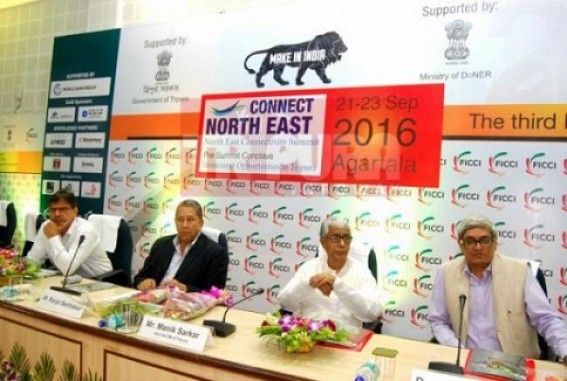Vishav

PHOTO : TIWN File Photo : Bibek Debroy (1st from left) at Agartala
NITI Ayog member Bibek Debroy admits that demonetisation was a temporary shock on growth but asserts that the economy has now climbed back. One year into the disruptive note ban, Prime Minister Narendra Modi's economic policy adviser says the worst is over and there are signs that things are improving now.
He also says demonetisation should not be seen through a narrow cost-benefit calculus but as a move aimed at "institutional cleansing".
"Yes, there has been a dip, but followed by a climb back. If you look at the data, there has been a slowdown in the growth rate continuously. I have not seen any data, even remotely statistical, which suggests that demonetisation has led to a more than temporary shock in terms of growth or employment," Debroy, who heads the Economic Advisory Council revived recently by the Prime Minister, told IANS in an interview.
Debroy said demonetisation should not be looked at only from an economic perspective.
"If I evaluate it with a narrow economic cost-benefit calculus, I think that would be unfair, because the intention (behind the move) was not narrow economics," Debroy said. The decision was aimed at institutional cleansing. "How do I even quantify and measure it?"
"If I look at it only with that economic lens, I will evaluate the costs and the benefits in a certain way. If I look at it with a political-economic kind of lens of cleansing up the system, I will evaluate it in a slightly different way."
Debroy said that purely in terms of economics, one will not have to wait too long as some data, like that of direct tax collections, would come out soon which would reflect demonetisation and help understand its implications.
There was "excessively high" prevalence of cash in the system till last year and cash-to-GDP ratio has now sharply declined by almost one-third post-demonetisation, he said.
Debroy said that before demonetisation, the cash-to-GDP ratio in India was almost 13 per cent. "That's excessive. It has now come down to a little over nine per cent," Debroy noted.
"A lot of the cash in India was excessive and was not yielding returns to the person who held the cash, nor was it performing the role that money performs as a multiplier."
"I'm not comparing with developed countries but even if you compare with other countries in South Asia, India had too much cash," he said.
As per estimates, the cash-to-GDP ratio was 5.8 per cent in Bangladesh, 3.5 per cent in Sri Lanka and 9.3 per cent in Pakistan in 2015, whereas in India it was 13 per cent.
"That excessive cash has now vanished. The money has now come into the banking system. But that does not necessarily legitimise that money. You have to subject yourself to further scrutiny," Debroy said.
Debroy has come out with a compilation, "On the Trail of the Black", along with his colleague Kishore Arun Desai, with contributions from several writers tracing the prevalence of corruption and evaluating its impact on society and the economy.
He admitted that every decision related to the demonetisation exercise might not have been perfect.
"But we know that with the benefit of hindsight.... and this kind of thing had never been attempted before," he said.
He said the biggest challenge in implementing the demonetisation decision was to maintain the surprise element which was crucial.
Kishore Arun Desai, who edited the book along with Debroy, said the war against corruption was a work in progress and November 8, 2016, should not be looked at in isolation.
"We're talking a lot about November 8, but there are a series of actions that the government has been taking ever since coming to power, starting with setting up an SIT on black money, followed by the Benami Transactions Act, an act for transparent auction of coal mines, the Income Declaration Scheme, the RERA Act and the Jan Dhan Yojana.
"We have been witnessing the overall intent of the government of cleaning up the economy across various sectors and demonetisation was just a trigger and one of the boldest steps," Desai told IANS.
- PM Modi's spectacular performance in India's By-Polls
- BJP-RSS want to destroy India's democratic structure: Rahul
- Kuldeep will be India's No.1 spinner going forward: Harbhajan Singh
- 2002 Gujarat riots: Despite request to CM Modi, Army lost a crucial day waiting for vehicles : Retd. Lt. General
- Progress of nation more important than debates: Kamal Haasan



